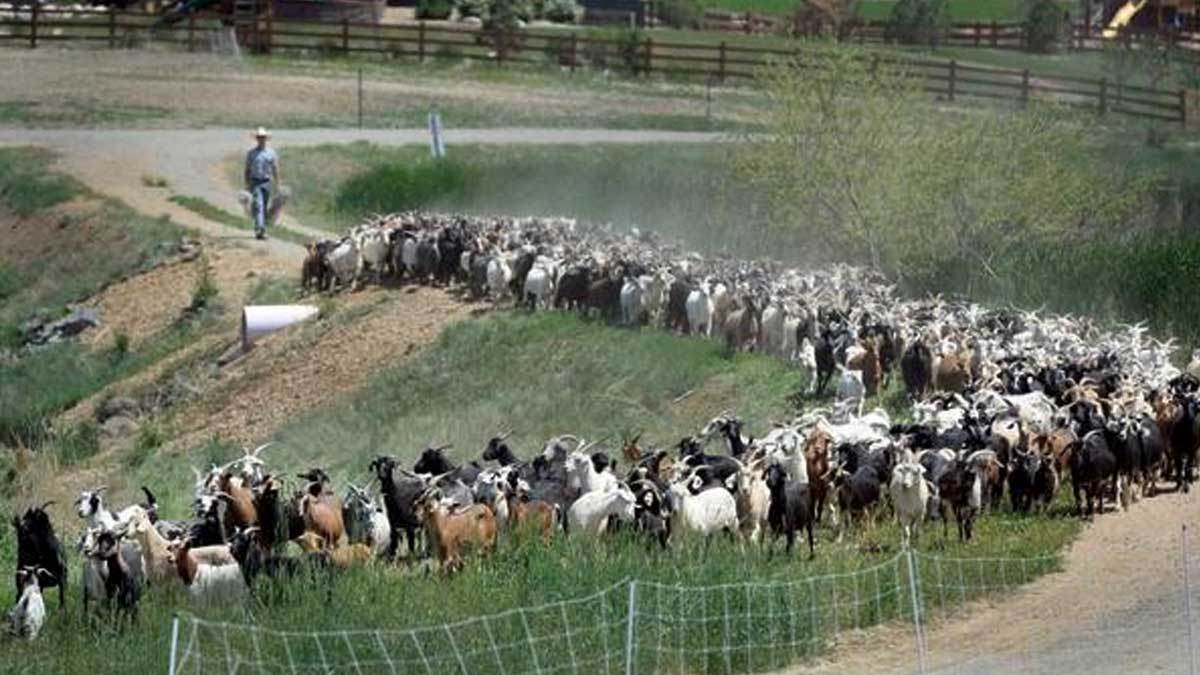
Originally posted May 16, 2012 by Kristen Leigh Painter / Website: https://www.denverpost.com/2012/05/16/broomfield-uses-goats-as-an-alternative-to-chemical-weed-control/
BROOMFIELD — A herd of 713 goats began grazing Broomfield County Open Space this week, providing furry all-in-one organic weed control and rangeland-restoration work through the end of the month.
Goats chewing their way through a 65-acre swath of open space near the Wildgrass subdivision — their movements minded by herding dogs and a young man in a wide-brimmed hat — are an unexpected sight.
“When everyone gets off work and on the weekends, we get 50 people lined up out here to watch,” said Donny Benz, goatherd and co-owner with his mom, Lani Malmberg, of Cheyenne-based Goat Green LLC.
But there’s a long legacy and serious science behind the concept of goats doing such work, said Kraig Peel, an associate professor in animal science at Colorado State University.
“They’ll do you a good service out in the pasture,” Peel said. “Ranchers have used goats for years on native pasture land, before it was cool to do so. It’s definitely a better alternative to spraying.”
There are many chemical options for killing weeds, but spraying will leave behind viable weed seeds and do nothing to improve the soil conditions that allow weeds to overtake native grasses, Peel said.
“This weed is a symptom of the problem, and the problem is the soil quality,” Benz said.
This is the fourth year Goat Green has been hired to clear unwanted weeds from Broomfield city and county open space naturally.
The full cycle of goat-based range management — typically three consecutive years of grazing — gets rid of the weeds, aerates the soil and fertilizes the receptive ground, Benz said.
Goats are careful browsers, preferring weeds to native grasses. Peel said goats can be conditioned to eat specific plants. In Mississippi, for example, they eat unwanted saplings as part of forest-restoration projects.
“They’ll go in and clean those plants out,” Peel said. “A good herder will keep them moving around, taking them to what they want them to take.”
The animals have a narrow, triangular mouth that grinds weed seeds to pulp that renders them useless by the time they pop out the other end in manure pellets spread across the rangeland.
“There’s a next-to-nothing chance that the seed will re-germinate because of this,” Benz said.
The process of weeding the grasslands extends beyond simply pulling up the symptom. Unless the hard-packed soil of the open space is properly aerated, rain can’t penetrate the land.
“They’re split-hoofed animals, so they till the soil,” Benz said.
Meanwhile, goat manure acts as organic fertilizer.
“We don’t want to kill anything,” Benz said. “We make stuff grow underneath.”
Peel, who managed a 74,000-acre goat ranch in Texas before he earned his doctorate, said the use of goats to manage noxious weeds has high appeal along the densely populated Front Range.
“I think the big thing in Colorado is the mentality of the majority of population, especially on the Front Range. They’re desiring a more biological control — and goats are absolutely viable,” Peel said. “Honestly, we should use goats more.”
With 1,200 animals and covering seven states, Goat Green is the largest goat-grazing company in the U.S. Clients range from major corporations to celebrities such as actor Harrison Ford and financiers such as Larry Rockefeller.
Benz says Goat Green’s clients often are fighting against the temptation of instant gratification.
“Nature’s Band-Aid is to put annuals and biannuals in,” Benz said. “People freak out, and the tendency is to spray a chemical. But you don’t want your kids and dogs walking through that.”
